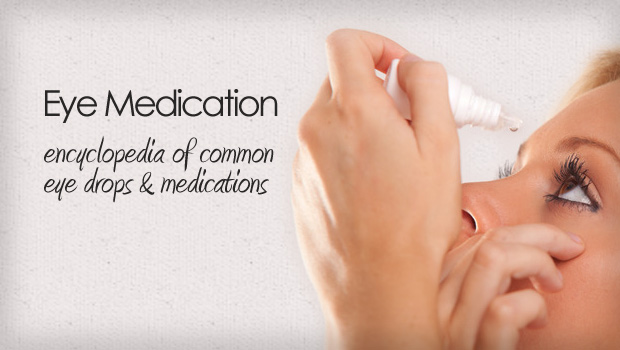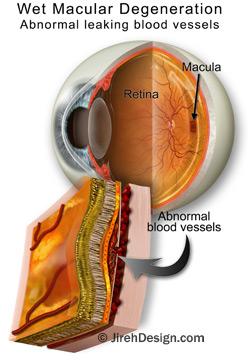Visudyne treatment for wet macular degeneration
Visudyne (vis’ yoo dine) Generic name: verteporfin: (pronounced “ver-te-POOR-phin” ) You should read this information before you talk with your doctor about […]


Visudyne treatment for wet macular degeneration
Visudyne (vis’ yoo dine) Generic name: verteporfin: (pronounced “ver-te-POOR-phin” ) You should read this information before you talk with your doctor about […]
Visudyne (vis’ yoo dine)
Generic name: verteporfin: (pronounced “ver-te-POOR-phin” )
You should read this information before you talk with your doctor about Visudyne. Your doctor can talk with you about this medication in more detail, including information about what to expect and potential side effects. Visudyne is given to patients in a doctor’s office by a qualified health professional.
What is Visudyne?
Visudyne is the first available drug therapy for people with a certain form of age-related macular degeneration (ARMD) known as predominantly classic “wet AMD.” It slows the progression of vision loss that is caused by predominantly classic wet AMD. Your doctor will determine if verteporfin therapy is the right choice for you.
Visudyne is given by injection and is activated by a non-heat producing laser light. Three months after the therapy, a doctor examines the patient to determine if re-treatment is necessary.
What is age-related macular degeneration (also known as “AMD”)?
AMD is a disease that affects a person’s vision. It usually happens in people who are 50 years or older. There are two types of AMD. About 90% of the people who develop AMD have the “dry” form, in which vision deteriorates slowly or not at all. The other 10% of people have the “wet” form of AMD. In wet AMD, abnormal blood vessels form in the back of the eye and block vision. Wet AMD is characterized by two patterns, classic and occult. Most patients have a combination of both patterns, and verteporfin therapy is beneficial when the AMD is predominantly or mostly classic. Many people who develop wet AMD suffer from severe vision loss in 2 to 3 years.
 How does Visudyne work?
How does Visudyne work?
Wet AMD occurs when abnormal blood vessels grow in the “macula,” the part of the eye that gives people their central vision. The verteporfin drug is injected into the bloodstream, usually through a person’s arm. The substance travels to the abnormal new blood vessels including those associated with AMD. A short while after the injection, the doctor shines a non-heat producing laser light into the patient’s eye. The light activates Visudyne. After it is activated, the verteporfin starts a chemical process that destroys the abnormal blood vessels.
Visudyne can slow the progression of vision loss that is caused by predominantly classic wet AMD. After one year of treatment, people who were given Visudyne had significantly less vision loss than those who received placebo therapy.
There have been recent studies showing that using anti-VEGF eye injections together with these photodynamic therapy treatments can increase the effectiveness of this treatment.
Who should not be given Visudyne?
People with porphyria or allergies to any of the ingredients of drug should not receive the treatment. Your doctor has a list of the ingredients of verteporfin.
What should I know about Visudyne (verteporfin for injection)?
Patients who receive Visudyne will become temporarily sensitive to light (photosensitive). Patients should wear a temporary wristband to remind them to avoid direct sunlight for 2-3 days (your doctor’s office will inform you). During that time, patients should avoid exposure of unprotected skin, eyes or other body organs to direct sunlight or bright indoor light.
This includes, but is not limited to, tanning salons, bright halogen lighting and high power lighting used in surgical operating rooms or dental offices. Treated patients who have to go outdoors in daylight during the first 2 days after treatment must protect all parts of their skin and their eyes by wearing protective clothing and dark sunglasses.
UV sunscreens are not effective in protecting against photosensitivity reactions because photoactivation of the residual drug in the skin can be caused by visible light. Patients should not stay in the dark and should be encouraged to expose their skin to normal indoor light, because it will help inactivate the drug in the skin through a process called photobleaching.
What are the possible side effects of Visudyne?
In studies, side effects did not usually cause patients to stop verteporfin therapy. Below is a list of some side effects reported with verteporfin therapy. Your doctor can inform you of the complete list of side effects. Some of the most commonly reported side effects included:
- Injection site reactions
- Visual disturbances (including blurred vision, decreased visual acuity, and visual field defects)
In addition, the side effects listed below were reported in fewer patients.
- Eye: Cataracts, conjunctivitis/conjunctival injection, dry eyes, ocular itching, severe vision loss, subconjunctival, subretinal or vitreous hemorrhage.
- Body as a whole: Weakness, back pain, fever, flu syndrome, sensitivity reaction to light.
- Heart: Atrial fibrillation, peripheral vascular disorder, hypertension, varicose veins.
- Skin: Eczema.
- Digestive: Constipation, gastrointestinal cancers, nausea.
- Hemic and lymphatic: Anemia, increased white blood cell count, decreased white blood cell count.
- Hepatic: Elevated liver function tests.
- Metabolic/nutritional: Albuminuria, creatinine increased.
- Musculoskeletal: Arthralgia, arthrosis, myasthenia.
- Nervous system: Hypesthesia, sleep disorder, vertigo.
- Respiratory: Pharyngitis, pneumonia.
- Special senses: Decreased hearing, diplopia, lacrimation disorder.
- Urogenital: Prostatic disorder.
This web page provides a summary of information about Visudyne. If you have any questions about Visudyne or AMD, talk to your doctor. Your doctor can give you additional information about Visudyne that is written for health professionals.
© 2000 Novartis; used with permission








